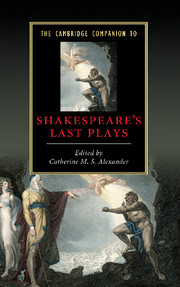Book contents
- Frontmatter
- Introduction
- 1 What is a ‘late play’?
- 2 Blackfriars, music and masque: theatrical contexts of the last plays
- 3 The literary and dramatic contexts of the last plays
- 4 Politics, religion, geography and travel: historical contexts of the last plays
- 5 ‘You speak a language that I understand not’: listening to the last plays
- 6 The Winter’s Tale: shifts in staging and status
- 7 Cymbeline: the afterlife
- 8 Literary invocations of The Tempest
- 9 Pericles: the afterlife
- 10 The Two Noble Kinsmen and King Henry VIII: the last last plays
- Further reading: Clare Smout
- Index
6 - The Winter’s Tale: shifts in staging and status
Published online by Cambridge University Press: 28 May 2010
- Frontmatter
- Introduction
- 1 What is a ‘late play’?
- 2 Blackfriars, music and masque: theatrical contexts of the last plays
- 3 The literary and dramatic contexts of the last plays
- 4 Politics, religion, geography and travel: historical contexts of the last plays
- 5 ‘You speak a language that I understand not’: listening to the last plays
- 6 The Winter’s Tale: shifts in staging and status
- 7 Cymbeline: the afterlife
- 8 Literary invocations of The Tempest
- 9 Pericles: the afterlife
- 10 The Two Noble Kinsmen and King Henry VIII: the last last plays
- Further reading: Clare Smout
- Index
Summary
Strange as it may seem today, The Winter's Tale has not always been perceived as one of Shakespeare's most compelling, powerful and ingenious plays, one that dares to mix comedy and tragedy in unlikely combinations, to employ language at the extremes of extraordinarily demanding syntax and heartstoppingly simple statement, to jump sixteen years, the leap eased by Time as chorus, and to introduce an oracle from Apollo, a bear, and, most bold and wonderful of all, a statue that moves after the command 'be stone no more' (5.3.99). For many years, however, these and other traits were treated as Shakespeare's apparent lapses or misunderstood because they did not meet prevailing critical standards: The Winter's Tale did not fulfil the unities; it mixed two, or even three, genres; it provided insufficient motivations for Leontes' jealousy and assigned him some incomprehensible lines; it introduced errors - such as a sea coast in Bohemia - as well as anachronisms and distractions, including Time, a bear and Autolycus. Looking for a coherent plot in The Winter's Tale, novelist Charlotte Lennox (1753) claimed that the 'incidents' of Shakespeare's source, Robert Greene's 'old paltry story of Dorastus and Faunia', were 'much less absurd and ridiculous'. It was, for example, inconceivable that Hermione, knowing that Leontes was repentant, chose 'to live in such a miserable confinement when she might have been happy in the possession of her husband's affection and have shared his throne'. As Lennox read it, the statue scene was 'a mean and absurd contrivance'. Completely missing the point, she argued that it was 'ridiculous . . . in a great Queen, on so interesting an occasion, to submit to such buffoonery as standing on a pedestal, motionless, her eyes fixed, and at last to be conjured down by a magical command of Paulina'.
- Type
- Chapter
- Information
- The Cambridge Companion to Shakespeare's Last Plays , pp. 113 - 134Publisher: Cambridge University PressPrint publication year: 2009



